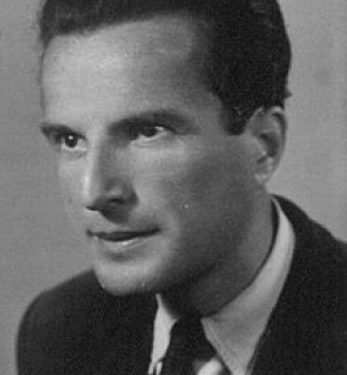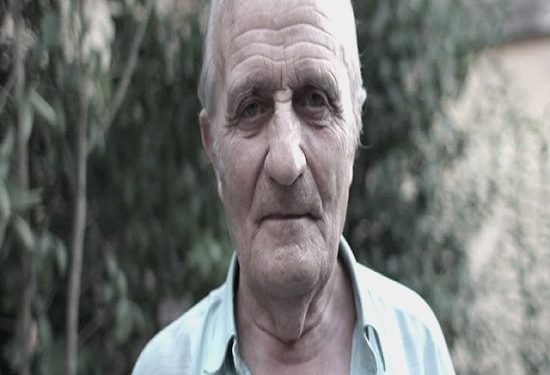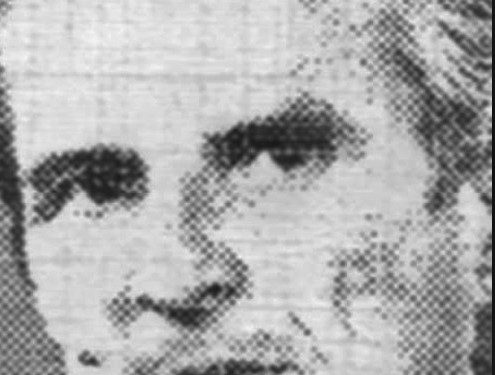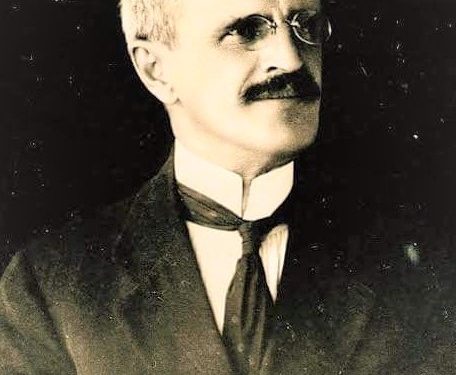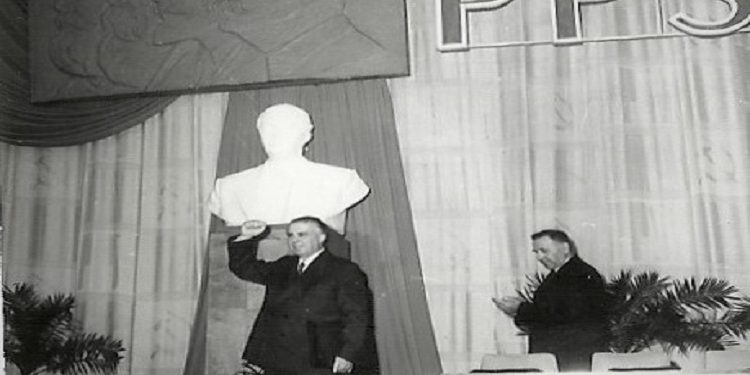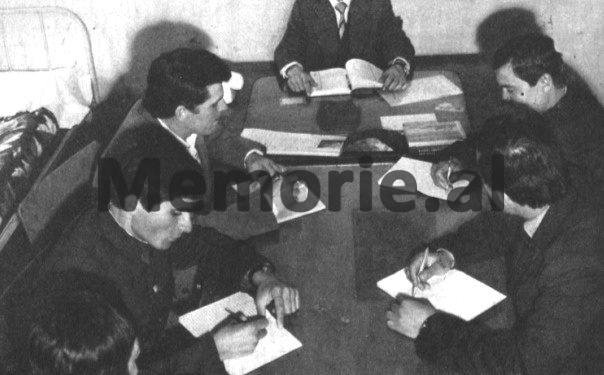By Islam Spahiu
In the memory of the memory
Memorie.al / Often times one thanks fate when one encounters some pleasure, and so I would call the occasion fortunate, when I came across the book of memoirs of Gaqo Peci, and I am also grateful to my honorable neighbor. Mr. Zisa Cikulit, doctor and poet, former Minister of Health, who had the delicate kindness to give it to me. The author’s name was enough to hurt my painful memories: I was in the ‘Kaushi’ of prison 313, in Tirana, in 1977, when I met him. We stayed together for only one day, because, as he himself says in these memoirs, the next day he would be admitted to the prison hospital. He was limping on one leg and it would crack every time he moved it; it was a consequence of the investigation…! However, even though for a short time, we communicated so much that I never forgot those moments.
“Time – Balzac said – is not measured by the number of hours, but by the events that fill it”. And, is it possible to forget the son of the patriotic voice, Sotir Peci, as well as those who accompanied him: the painter Vangjush Tushi, (brother of Kostas…my classmate at the Artistic Lyceum) and Kiço Venetikun, the physics professor and musician, who had organized the fanfare of the city of Korca? When I saw them together, they seemed to me like a “trinity”, surprisingly symbolic, as if it had been deliberately invented.
They represented (willingly or unwillingly) the main areas of our national culture: a poet, a physicist and musician at the same time, and a painter. These rare figures had been caught by the scythe of the “Dictatorship of the proletariat” and had been brought there, “among lost humanity” (Dante). After we separated, we never saw each other again; it didn’t take a miraculous fate. Only much later, I learned that Gaqoja had died in 2001 (19 years after his release), while the other two had not come out of there alive. And the more time passes, the more painful the memory becomes for me.
Pain
Feeling as the inner side of man, with its external manifestation (expression), have an indirect connection: and this for two reasons. First: Pain cannot be expressed when it is in action. It is the same as “you drop oil on the sand, where the wind blows”, said A. De Myse, because, he says; “she would be broken like a wretched reed” (idem). This means that only when the storm passes, when the smoke of the confusion of feelings disperses, when peace and tranquility descend, only then does the eye see and the ear hear clearly what has happened in the soul.
Second: Usually listeners are not inclined to listen to sad stories: whereas they await humor with pleasure. The first increases their suffering, from which no one is deprived, while the second alleviates them. This is precisely what an aphorism of Nietzsche speaks of: “Sharing joys, not sorrows, creates friendship”.
It is generally known that in order to create, in addition to great effort, a special gift is also required. Then, “it is not said to write about prison, just because you have been in prison”, one of our writers has rightly said. Considering what we have said, it naturally comes to the question of the assessment that should be to do with the book, which we have here as the object.
In my opinion, Gaqo Peci has passed the test with complete success: He should be appreciated especially for his original style, where there is no attempt to use artificial means, inflated stylistic figures, with the aim of creating an effect. Not at all. He dares to use simplicity, naturalness of expression, thus gaining the epic power of ancient art.
He proves this to the culture and poetic pathos, which are irreplaceable in the field of literary creation. Fellow sufferers will probably not need art to understand his pain, but the ordinary reader, carried away by the magic of that simplicity that is as magnificent as nature itself, will rise to such a height as to feel and understand it. And this is no small thing.
The Martyr’s Message
This year, since the book “In the Paws of the Security”, by Gaqo Peci, was published, I do not know if anyone took the noble initiative; to highlight this cultural event of special importance. Without a doubt, many books have been written after the collapse of the dictatorship; these in various fields, but less in those of historical-artistic literature, and especially the one that would constitute the epitaph, so to speak, of the fifty-year ordeal of our nation. This fact becomes even sadder when you hear a “politician” of our days say, as if without harm: “We will not deal with the past”!
Then the questions come naturally: “Can you have a present without a past? Or; “Can there be a future without a present? Of course, the answer has been given by historical experience, and woe to him who does not learn from it! Thinking like this, I remembered the note that Victor Hugo put on the cover of his famous novel “Les Misérables”:
“As long as there is ignorance and misery in the world, books like this cannot but be useful.” – Then I remembered what I had read a long time ago, and which I have never forgotten. They are writings about the suffering of prison. They are known as masterpieces of this kind, for example; “My Prisons”, by Silvio Peliko, “Memories from the House of the Dead”, by Dostoevsky, “The Gulak Archipelago”, by Solzhenitsyn.
I would add to these; “Reportage with a Rope in the Throat”, by Julius Fuçik, which, I don’t know why, has left an indelible mark on me. I would say that these great pens have engraved this aspect of past life in the memory of humanity, even with the power of art, so that it will never be forgotten. And it is sometimes harder to forget than to remember.
If we delve further, we come to the conclusion that what cannot be forgotten is precisely what should not be forgiven. “There are things that are not forgiven”, Albert Camus once said. This message is also left to us by our fellow sufferer with his painful memories, as a dedication: – “to those who loved freedom and homeland more than the eyes of their foreheads”.
Analogy
In the perspective I have taken, the book “In the Panxhat e Sigurimit”, I see in the analogy of prison-hell and, by comparing it to Dante’s Inferno, I think it is easier to understand the philosophy of the subject. The author unwittingly becomes our “Virgil”; he seems to take us by the hand and lead us through the “city of pain”, where he himself experienced “the eternal darkness, the ice and heat of prison cells. With a simple style, without rhetoric, nor stylistic figures, almost of conversation, he captures you and introduces you to that epic world, even though he does not have the sublime art of the great Italian classic.
The analogy that we are using here is certainly not identity, it is more of a parable; it has in itself the change of things and, perhaps, this makes this phenomenon more powerful. While on the gate of Dante’s Hell, it was written: “Justice urged my high creator”, on the gate of the human prison, without being written, it is read: “Injustice led the lowly despot”. As can be seen, the analogy here lies only in torture, in suffering, while the subject and the object are opposites. In Dante’s Hell, justice acts divine, while in the earthly, human injustice.
The object of the punishment that Providence gives is the sinner, while that of the dictatorial system is the innocent; and in the world of the living, evil is greater. “What is more fantastic to me than reality”? (Dostoevsky). In the Bible, chapter 10, verse 31, it says; “It is a fearful thing to fall into the hands of the living God”…! Without going into the analysis of this enigmatic phrase, we can say that; this was precisely the fate of the author of these memories, as well as thousands and thousands of other innocent people. And; “He who has not experienced it cannot understand it!” (Dante Alighieri).
In the valleys of hell
The importance of these memories lies first in the fact that they reflect an absurd reality that cost humanity so much. They belong to the period of the almost 50-year-old Red Terror, when the fanatics of a new cult, never seen before, of an atheistic cult, of “idols without pride”, were constantly looking for victims, like the Mexican priestesses, who repeated the cry to Montezuma: “The gods are thirsty”! Thus, the idols without pride quenched their thirst; “with the blood” of the “class war”. This phenomenon, paradoxical as it was, was not disappearing, but on the contrary. According to the great inquisitor, “it is becoming more and more severe”! (Stalin).
Meanwhile, the Cerberus of Pluto here in our country, carried out this task with the greatest fanaticism, so much so that it surprised the teacher himself. “He who lives by fighting an enemy has an interest in always having him alive”! (Nietzsche) Thus, from this existential necessity, when one side was eliminated, the other was sought. When it was not, it was invented. In this way, war began within the clan, (war within the species is one of the most terrible). Have we not experienced this tragicomedy too?
Another analogy with ancient history: When the affairs of a community were not going well, this meant that the gods were displeased: even angry. Then there was a need for them to be appeased. For this, a sacrifice was required. This rite was performed without considering even the simplest logic. The sacrifice could be anyone, from the most miserable hut to the most brilliant palace. The sacrifice was determined by several priests, according to the signs of the stars.
In this blinded state of the people, burst into festive “hosannas”. So, let’s follow the author and take a look at his “City of Pain”: In a few lines, he presents his simple life in his hometown; (Korça). He lived in average economic conditions, although he enjoyed the dignity of a distinguished teacher, active in the field of linguistics. He had participated in the Albanian Language Spelling Congress in 1972.
But here is the ominous prologue: He was alone at home and, while cooking pasta, he listened to his favorite music by Rai Due. Meanwhile, there is a knock on the door. They announce that he must appear at the Executive Committee, to start his service as a French translator for foreigners who would come to the 7th Congress of the Albanian People’s Party.
He goes to Tirana, but returns in handcuffs. This was already the entrance into the “eternal darkness” where he would face those who “have lost the goodness of their minds” (Dante), with the hatred of the “class war”, with the barking of Cerberus, with arrogance, meanness and lies, with every evil. From now on, every step taken descends more and more into the kingdom of Pluto. His dwelling is now the dungeon, while his “partner” would be the investigator, the instrument of torture.
No illusions about human rights. “Abandon all hope, you who enter here”, it was read. The vocabulary is simple, grotesque: starting with; “enemy of the people” and, continuing with; “dung”, “stink”, “scum” etc. And often, instead of a word, a sudden slap in the face, a punch in the stomach or, a kick where you remain crippled.
Thus hours, days, weeks, months and perhaps years pass. There is no certainty. The guilt or “sin” is only that “you are unhappy”, or “you have slandered”, etc., etc., like these. Well, “either with me, or against me! There is no middle ground”! “Me or you” – the terrible dilemma of that madness, where man is forced to be a victim, or an executioner. The process begins in Pogradec and ends in Korça, passing through the “bolgia” of the Sigurimi basements.
They confront two others trapped there, with equally absurd accusations. Someone had invented something to save their skin. “Stupidity! What is skin that is made with the skin of another”: said Julius Fuçik. The names….(investigator) and Bajram…. (Deputy head of the Internal Affairs Branch) run through this painful story like a bloody brush. These are the demons who amuse themselves with the victim, who would finally fall into the clutches of despair; here is the suicide attempt.
They do not leave her: she belongs only to them in case of need. They find her at the last moment and raise the alarm. If she died, they would lose a material by which they lived. It is known that Christ, in addition to physical tortures, also suffered moral ones. Temptations or seductions are very meaningful. Our author, who in this case is also a character, naturally thinks of his relatives, his wife, his daughter, his sister: are they alive?
Where and how will they be? Who should he ask? He had provocateurs, who brought them there. “Hell is others”, wrote Sartre. Living under the supervision of others, whoever they are, good or bad, is unbearable. However, the chance, the miraculous chance, comes there. He finds out from someone that his sister was alive…!
A strange moment of happiness: “She is alive”! The ordeal continues. Here are the chapter titles, like exclamations of pain: “Rifati again”, (confrontation with a camouflaged agent). “The murder of the investigator”, a sensational news that would increase the tension.
Then: “Christine”. “Confrontation with Kiçon”, “The Bag of Food”, “The Fingerprints”, “The Cuckoo”, “The Knock on the Wall”. “Blow on the Head”, “The Spy Among Us”, “Speak… speak… speak…”, “Wild Pain”, “When You Are Down”; “A Long Road of Torture”.
And so, “In the courtroom”: “Confrontations with Kristina, the painter”, continuing with; “Me and the literature of socialist realism”. Further a series of testimonies: “Comrade Emin”, “Comrade Hamza”, “My student”, “Comrade K.K.”, “Comrade…”, and several others with initials and, finally, pretense, punishment, scolding, ending in the Tirana hospital-prison, in 1977.
And here instead of an epilogue: “I feel sorry for you, O God, that I continue to walk the path of sin, reminding you that, neither You forgive, neither Adam, nor Eve, nor the generations that descend from them and, who inherit the original sin, just as You did not forgive Cain, when he raised his hand and stained the ground with the blood of his brother.
Therefore, I cannot forgive either and I do not want them to forgive. All the sins of the world, let them fall on my shoulders, but only if the honor of an entire nation and of man is restored, only if Albania is cleansed once and for all from the thorns, thorns, nettles and snakes”.
No more words than the message of this martyr, of this poet, of this humanist philosopher. We have no choice but to carry out his bequest: Let us never forget you! Otherwise, we are lost! Memorie.al




